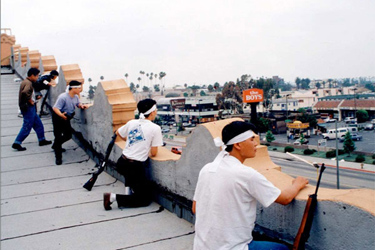
Armed men on a rooftop overlook Western Avenue during the 1992 Los Angeles riots. Many Koreans say the riots made them realize they needed more of a political presence. (Korea Times)
The Los Angeles Police Department let down this city in varied and profound ways during the early 1990s. Officers beat Rodney G. King into submission, confirming the public's worst suspicions about a brutal and racist LAPD. Police failed to intervene as truck driver Reginald Denny was attacked by a band of thugs at the intersection of Florence and Normandie. And the riots that followed, which began while the department's chief attended a fundraiser to defeat police reform, broke what was left of civic self-confidence.
Among the most durable and dispiriting images of that era, however, were those of Korean merchants taking to their rooftops in the opening hours of the riots, arming themselves because they were convinced that they were alone, that the LAPD would not be there for them. They were right.
Today, the LAPD's Olympic Division, located in the heart of a Korean neighborhood, is among the department's most acclaimed. It led the LAPD in overall crime reduction in 2009, and in violent crime reduction the year before that. Violent crime was down another 11% in 2010. Homicides have plunged from 23 in 2009 to four last year. The station is new, clean, professional and inviting.
Olympic Division is run by Capt. Matt Blake, a second-generation LAPD officer. He came to the department in 1987, when his father was a 20-year veteran. He's white, male and fit - the very picture of the LAPD in the old days. But Blake is immersed in modern policing, deeply thoughtful about deployment and statistically driven crime strategies. He has known the department's glories and its defects; he's proud of be part of its recovery.
For Olympic, that began with a promise. "The commitment that this department has made to the community is simple," Blake explains, recalling the 1992 riots and the alienation they produced. "This will never happen again."
The atmosphere of the station is near polar-opposite of that which pervaded the LAPD in the early 1990s. Then, a gruff grittiness bound officers together. They worked in dilapidated cars outfitted with outdated equipment. They built a defensive camaraderie around such icons as the 77th Street station, where seismic worries had raised questions about the stability of the building. The city's response: It chopped off the top floor and went about its business. Under poor leadership, officers pulled back from the public to which they were pledged to "protect and serve."
For the LAPD, life began to change under the administration of Mayor Richard Riordan, who campaigned on a promise to expand the department and both enlarged and equipped it. Mayor James Hahn built on that success by hiring William J. Bratton as chief. And Mayor Antonio Villaraigosa, to his lasting credit, has gone still further, pushing through an increase in trash fees that helped pay for an expansion of the force and defending those gains even as the budget has come under increasing pressure.
The results are evident at Olympic, where, on the December evening I visited, officers - male and female, Latino, black, white and Asian - gathered for an evening roll call and to discuss a rash of burglaries and robberies bedeviling local residents. By the end of the month, the culprits had been arrested and the problem had subsided. Olympic ended the year on target to achieve its desired crime reductions.
Perhaps more important, it's a police station where officers and commanders listen to the public rather than preside over it. When an officer shot a young autistic man in the spring of 2010, the community at first recoiled. "In the old days," Blake acknowledges, the police response would have been to "bar the gates, don't say anything." Instead, he met with the family, explained why his officers saw a threat in a hooded, non-responsive man, hands at his waist, reactions hard to discern. Tensions, once strained to breaking, subsided.
None of this progress has been easy. There are 23 active street gangs in the 6.2 square miles of Olympic Division, and Blake has 268 sworn officers to confront them. He strategizes with his watch commanders and sergeants as to how best to respond to the division's challenges. They examine maps, pore over data. Their goal is to push serious crimes down to below 93 a week. On the week before my visit, they recorded 69. "That's a great week," Blake boasted, with justification.
After an evening at the station, I turned to head out. As I left, the desk officer was patiently counseling three Korean men. Dressed in suits, one of them with a notepad, they had come in with a concern. The officer spoke with them, resolved their question and shook hands all around before they turned to leave. The entire exchange was conducted in Korean.











